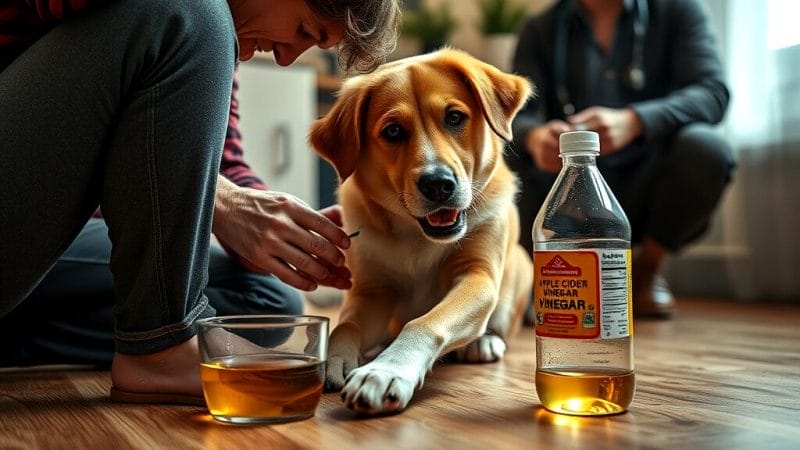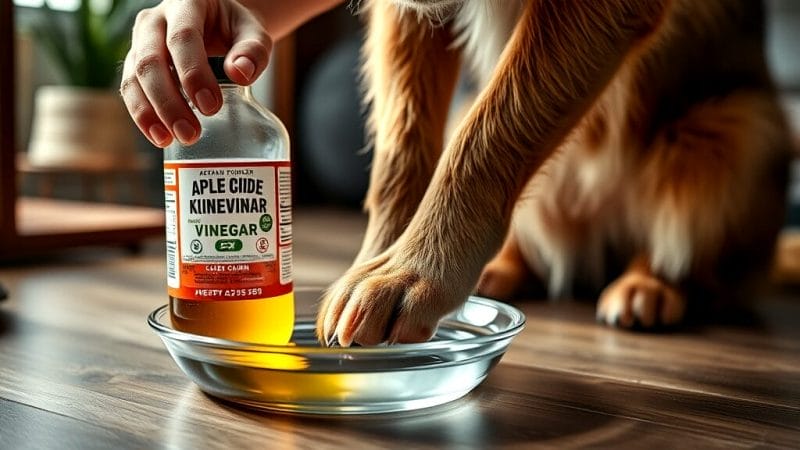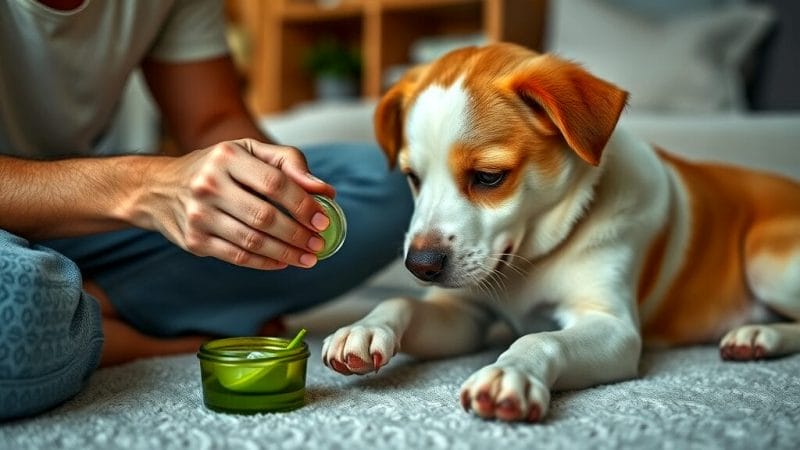How To Stop Dog From Licking Paws Home Remedy
Is your dog constantly licking their paws, and it’s driving you up the wall? You’re not alone. Many pet owners face this puzzling behavior. Understanding why your dog is licking their paws can help pinpoint a solution. It could be allergies, stress, or simply boredom. Whatever the reason, consistent paw-licking isn’t something to ignore.
Checking your dog’s paw pads for cuts or debris is a good start. This simple step might reveal the root cause. Want to try a paws home remedy? An apple cider vinegar soak can help deter your dog’s habit. Other effective home remedies include oatmeal baths and coconut oil. These solutions offer relief and help stop paw licking. If your dog continues, consult a dog trainer or vet.

Why Do Dogs Lick Their Paws? Root Causes
Paw licking in dogs can be caused by allergies, anxiety, or boredom. Sometimes, underlying medical conditions are the culprits. Identifying the reason is crucial for finding effective home remedies to stop dogs from licking their paws. Allergies might stem from food or environmental factors. Anxiety, akin to humans biting their nails, could be another trigger. A dog licking paws excessively might be crying for help.
Regularly checking paws is essential. Look for signs of discomfort like discoloration or swelling. A soak with apple cider vinegar can be beneficial when seeking a paws home remedy. Or consider an oatmeal bath to soothe irritated paw pads. If a dog stops sleeping or licking persists, it’s time to consult a professional. Remember, your pet’s comfort is in paw-positive hands!
Recognizing Licking as a Sign of Distress
Identifying when excessive licking suggests a dog is stressed can be a game-changer. Your canine’s persistent licking might mirror a human’s nervous habits, like nail-biting. It’s crucial to address this behavior, as it could signal discomfort or anxiety. An effective approach is to explore home remedies tailored to ease this habit. One popular remedy involves the use of apple cider vinegar to deter licking. A simple vinegar soak can offer relief, calming the senses and soothing irritated paw pads. Coupled with regular checks for cuts or debris, these remedies can help stop dogs from licking their paws. If the habit persists, seeking a professional opinion is wise. Consulting a dog trainer or vet can provide further insights, ensuring your pet’s paws remain in top condition.

Importance of Regular Paw Examination
Regular checks on your dog’s paws are crucial for spotting potential issues early. Inspect for signs like cuts, debris, or unusual swelling. These can indicate discomfort, prompting your dog to lick their paws obsessively. To stop a dog from continuing this behavior, it’s essential to address the root cause. Consider a soak your dog in a soothing solution, like diluted apple cider vinegar, to deter licking with its bitter taste. This method offers a natural way to discourage the habit. Consulting a professional, such as a dog trainer, might be necessary if the behavior persists despite these efforts. They can offer additional insights and solutions tailored to your dog’s needs. Regular monitoring and care ensure the well-being of their paw pads.

Identifying Cuts or Injuries on Paws
Spotting abrasions or injuries on paws requires keen observation. Examine between toes and underfoot for any signs of damage. Look for cuts, swelling, or redness, which might explain why your dog is obsessed with licking their paws. Using a flashlight can help illuminate those hard-to-see areas. It might indicate discomfort if you notice tenderness or a change in your pet’s gait.
Consider a simple soak your dog in chamomile tea to soothe irritated skin. Or, if your dog licking paws seems relentless, perhaps a coconut oil massage could provide relief. These methods often help stop a dog from continuing to lick excessively. If issues persist, professional advice is advisable. Consistent checks and care will ensure your pup’s paws are in the best shape.
5 Effective Home Remedies for Paw Licking
To tackle the issue of dog licking paws, try these reliable remedies. Begin with an apple cider vinegar soak: mix equal parts with water. This natural solution can deter your dog with its bitter taste. Consider an oatmeal bath to soothe inflamed areas—gentle and calming. Coconut oil is another option; its antimicrobial benefits can moisturize and relieve discomfort. A dab of aloe vera offers soothing relief for irritated skin. Lastly, a chamomile tea soak might calm the irritation thanks to its antibacterial properties. Checking paws regularly for injuries or debris can further resolve the issue. If the situation doesn’t improve, consulting a vet might be necessary.
Utilizing Apple Cider Vinegar Soak
Using an apple cider vinegar mixture can help deter paw licking effectively. Combine equal parts of apple cider vinegar and water for a simple solution. This blend’s bitter taste is often unappealing to dogs, helping to curb the habit. Ensure your furry friend’s paws are clean before the soak to maximize its benefits.
Dip your dog’s paws in the solution for a few minutes and pat dry thoroughly. Consistency is key—repeating this process regularly can reduce the licking behavior over time.
If the vinegar’s scent is too strong or your pup seems sensitive, try diluting it further. It’s a straightforward approach that might just be the trick to stop a dog’s persistent licking. With patience and persistence, this method could be your answer to ending the cycle.

Benefits of an Oatmeal Bath
Indulging in a soothing oatmeal bath can be a game-changer for your pooch’s itchy paws. This simple yet effective treatment is an excellent choice to help stop paw licking by providing a natural, anti-inflammatory soak. The oats are gentle on your dog’s skin, reducing irritation and inflammation swiftly.
If your pup constantly licks paws, consider this approach part of your toolkit to stop a dog from this pesky habit. You can easily prepare the bath by grinding oatmeal into a fine powder and mixing it with warm water, allowing your pet to soak.
Not all dogs respond the same, so patience is crucial. For more natural solutions, the American Kennel Club offers a range of remedies to explore here.

The Magic of Coconut Oil
The wonders of coconut oil extend beyond the kitchen, offering a soothing balm for your pet’s itchy situation. If your dog licking paws issue persists, this natural moisturizer might be the answer. Gently massage a small amount onto the affected area. Coconut oil’s antimicrobial properties can provide relief and prevent further irritation.
While some dogs might try to lick it off, the taste isn’t harmful. Plus, it moisturizes and soothes the skin, making it an excellent home remedy paw licking solution. Be sure not to over-apply, as too much oil can create a slippery mess.
Always ensure the area is clean before application to maximize benefits. If you’re trying to stop a dog from this habit, consider coconut oil as part of your toolkit.

Applying Aloe Vera for Soothing Relief
Transitioning to a soothing remedy, aloe vera can be a game-changer for your pet’s irritated paws. This succulent gel not only cools but also protects against further irritation. When applied, it delivers a calming effect, reducing the urge to lick.
Its hydrating properties also keep the skin moisturized without feeling greasy. However, some dogs might be tempted to lick it off, so supervision is key. Consider visiting a vet if you’re still seeing your pooch gnawing at their feet.
For more insights, Union Lake Veterinary Hospital discusses different strategies to address paw-licking here. Remember, consistency is crucial when stopping a dog from this behavior. A regular routine can be your best ally in this journey.

How Chamomile Tea Soothes Paw Irritation
Soothe irritated paws with chamomile tea—a gentle remedy for your dog’s discomfort. This natural brew boasts soothing and antibacterial properties, making it a go-to for calming irritated skin. To apply, simply brew a strong cup, let it cool, and then soak your dog’s paws in it for a few minutes. This process not just soothes but can help deter any paw licking habits.
Moreover, chamomile tea’s calming aroma might even relax your pup, turning paw care into a peaceful ritual. For particularly stubborn cases, consider repeating the treatment regularly. Just ensure your pooch isn’t tempted to sip the brew!
Incorporating chamomile into your routine can be a simple yet effective way to address paw woes. If issues persist, professional advice is always a wise choice.

Diet and Nutrition: A Factor in Paw Licking
A dog’s diet can influence paw-licking behaviors. Feeding your pet foods rich in Omega-3 fatty acids may help calm inflammation, reducing the urge to lick. Consider consulting a vet to identify potential food allergies that could trigger this behavior. Experimenting with different proteins or grains might also be beneficial. Have you ever thought about oatmeal as part of your diet? The American Kennel Club explores whether dogs can eat oatmeal, a healthy choice for some. While dietary changes may not immediately change behaviors, they can offer long-term relief. Remember, every dog is different, and what works for one might not suit another. Monitoring your dog’s response to diet adjustments is crucial, as is seeking veterinary guidance when necessary.

Selecting the Right Dog Shampoo
Choosing the appropriate shampoo for your pet involves more than just scent selection. If your dog licks its paws frequently post-bath, it might be time to reconsider the type of shampoo you use. Opt for a natural, moisturizing formula to soothe irritated skin. Dogs can be sensitive to harsh chemicals, and a gentle shampoo can minimize inflammation.
Integrating home remedies, such as paw licking solutions like coconut oil or oatmeal baths alongside a suitable shampoo, can enhance paw care. Curious about more remedies? Experts at OK Vets suggest checking your dog’s diet and environment for allergens.
Remember, if symptoms persist, it’s wise to consult a veterinarian. They can help identify underlying issues contributing to excessive paw licking.

Considering Dog Booties: Pros and Cons
Thinking about dog booties might have you weighing their benefits and drawbacks. Booties can shield paws from rough terrain and reduce licking caused by irritation. However, dogs might resist wearing them, creating a comical but frustrating experience. For some, booties become an essential tool, especially in extreme weather or on hot pavements. Yet, ensuring the right fit is crucial to avoid discomfort.
While booties can be a great solution, not every dog will take to them. Consider pairing booties with solutions like paw wax for added protection. Sometimes, lifestyle changes or adjustments can offer relief, such as trying a new home remedy paw licking approach. Other remedies can be explored at WikiHow for those interested.
When to Seek Professional Help: Signs to Watch
Knowing when to watch for signs that call for expert guidance is crucial. If your furry friend’s licking persists despite trying every home remedy paw licking trick, it’s time for a professional opinion. Imagine your pup’s paws as soldiers marching through rough terrains—endurance has its limits! Persistent licking might signal deeper issues, not just an annoyance. Keep an eye out for redness, bleeding, or foul odors. These could indicate infections or severe allergies that need a vet’s touch. Just like us, sometimes our pets need that extra care. If your dog becomes increasingly anxious or aggressive while you try to soak your dog’s paws, it’s worth consulting a vet. Trust your instincts; they’re often right!
